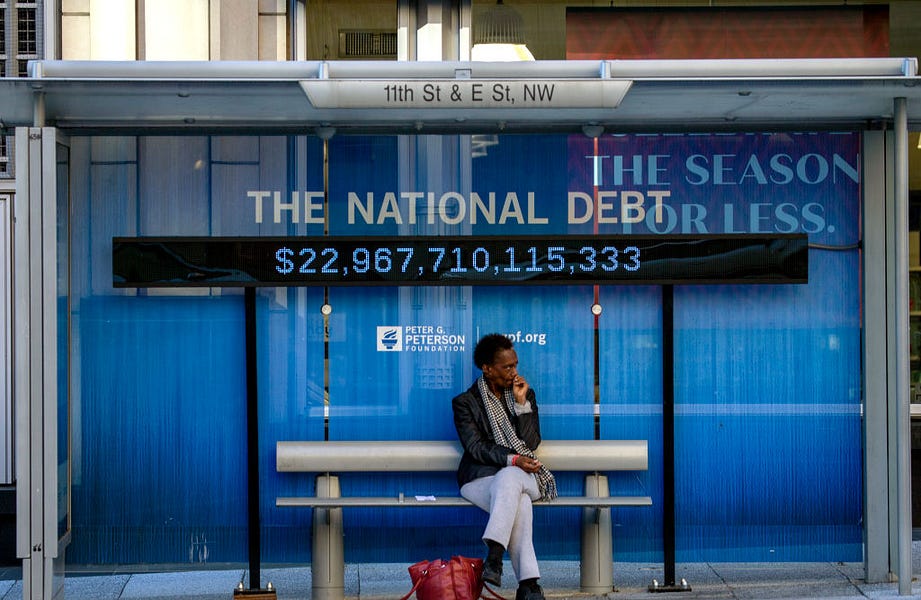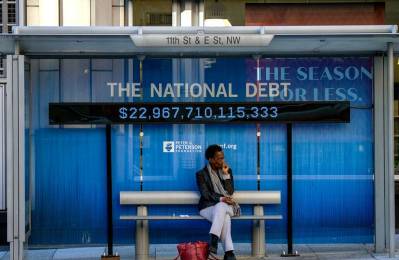Democratic presidential candidates have spent the primary season promising the largest non-war spending spree in American history. Sen. Bernie Sanders has promised a staggering $97 trillion over the next decade. Before she dropped out last week, Sen. Elizabeth Warren had proposed approximately $50 trillion. Former Vice President Joe Biden has looked like Barry Goldwater by comparison, promising “only” $6 trillion in new spending above the current $60 trillion baseline level. All of these candidates are far to the left of President Obama, who regularly proposed about $2 trillion in new spending over the next decade.
Let me offer an idea that may sound crazy in Washington, D.C. Before doubling government spending, why don’t we pay for our current commitments first?
The Congressional Budget Office (CBO) projects that annual budget deficits will surpass $1 trillion this year, and approach $2 trillion within a decade. Even if the presidential candidates actually paid for all their spending hikes—which is nearly impossible—it would still leave $13 trillion in underlying budget deficits over the next decade, and a national debt roughly the size of the entire economy.
In fact, even a “deficit-neutral” presidential agenda that matched $50 trillion in new spending with equal taxes would still worsen the long-term budget picture, because it would use up all the savings proposals that would otherwise be needed to close these underlying deficits. There aren’t enough potential taxes to both close the existing deficit and finance a historic spending binge. As Margaret Thatcher once pointed out, eventually you run out of other people’s money.
It has become fashionable to suggest that burgeoning budget deficits are acceptable because interest rates are low. This view is extraordinarily short-sighted. Even in the CBO baseline—where interest rates are projected to remain well below the levels of the past 40 years—interest costs on the debt would still become the largest item of the federal budget, and consume 42 percent of all tax revenues within 30 years. By that point, the projected national debt is so large—$100 trillion—that even a 3 percent interest rate would bring $3 trillion in annual interest costs. And if rates do rise, each one percentage point would cost $1.8 trillion over the decade, and $11 trillion over 30 years (or 16 percent of the economy). That means an interest rate hike of 2 percentage points would cost taxpayers more than the entire long-term Social Security shortfall.
Gambling America’s fiscal solvency on the hope that interest rates never rise again—even though soaring debt typically raises rates—is extraordinarily dangerous and hubristic. It also ignores the reality that even low interest rates on a $100 trillion debt would bring a colossal annual interest tab.
So what would it take to balance the budget for the next 10 years? Let’s use the tax proposals favored by progressive candidates.
The CBO baseline assumes $13.1 trillion in deficits over the decade—and even that assumes the eventual expiration of most of the 2017 tax cuts. Instead of waiting for this expiration, let’s assume an immediate repeal of the entire law. This includes scaling back the child tax credit, raising income tax rates across the board, and pushing the corporate tax rate back up to the 35 percent rate that once topped the developed world. That gets us $461 billion over 10 years.
Next, Bernie Sanders’ 8 percent wealth tax would raise $2.8 trillion, if you disregard the unworkability, economic damage, and disappointing revenue figures that caused most of Europe to abandon wealth taxes of even 1 percent or 2 percent.
Social Security payroll taxes are paid on the first $137,700 of annual wages. Eliminating that cap (without correspondingly raising benefits) would raise $2.3 trillion over the decade.
Rep. Alexandria Ocasio-Cortez has advocated a 70 percent income tax rate on earnings above $10 million, which would combine with state and payroll taxes (with no wage cap) to push marginal tax rates as high as 92 percent. This would raise just $189 billion.
We’re still not even half way to balancing the budget.
Raising capital gains tax rates and applying “mark-to-market” taxation—where taxes are paid each year on rising investment valuations even if they have yet not been sold or become income—would raise $2 trillion. This policy would face significant administrative challenges.
Sen. Sanders claims that his proposed 77 percent estate tax rate would raise $336 billion. Elizabeth Warren’s 7 percent “real corporate profits” surtax would collect $476 billion. Eliminating accelerated depreciation and other targeted corporate tax breaks would bring in $1.5 trillion.
CBO estimates that a financial transactions tax would raise $777 billion, a “bank tax” on large financial institutions would collect $103 billion, and repealing the remaining tax breaks for oil and gas would bring in $9 billion.
Finally, a $25-per-metric-ton carbon tax would bring in $1.1 trillion while disproportionately burdening low-income families, as they spend a bigger share of their income on energy costs than higher earners.
Reduced interest costs on the smaller national debt—partially offset by the revenue lost to the cumulative interactive and economic effects of piling new taxes on top of each other—would provide the final $1 trillion.
I did not include the common call to immediately “slash America’s defense budget to European levels” (which would mean dropping it from 3 percent to 2 percent of GDP, saving $2.6 trillion over the decade) because advocates have produced no plausible blueprint to back up this talking point.
To recap: Applying progressive tax proposals to balance the budget would require slamming upper-income families with: 1) marginal tax rates rising to 92 percent; 2) unprecedented tax rates on theoretical investment returns that the investors have not even collected as income; 3) estate tax rates as high as 77 percent; 4) wealth tax rates far exceeding the levels Europe abandoned; and 5) combined taxes on investment that would exceed 100 percent. Low-income families would face higher income tax rates, a carbon tax, and a reduction in the child credit. Corporate tax rates would double to the highest rate in the world, while long-standing tax deductions for new business investments would be eviscerated (inducing more companies to relocate overseas).
And all we’ve done is pay for Washington’s current spending commitments. We haven’t financed a nickel of Bernie’s $97 trillion progressive agenda.
It gets worse. The underlying budget deficit—driven by escalating Social Security and Medicare shortfalls—will continue growing rapidly in future decades. Therefore, keeping the budget balanced over the long-term would require eventually imposing a value-added tax (like a national sales tax) that rises to 12 percent, or hiking the payroll tax rate from 15.3 to 21 percent. Alternatively, lawmakers could skip these final tax increases and run sustainable budget deficits of around 2 percent of the economy over the long-term.
In the progressive fantasy world, a socialist utopia can be funded simply by taxing billionaires. Mathematical and economic reality says otherwise. The U.S. already has the most progressive tax code in the OECD. Europe does not even tax corporations, wealth, and estates at the stratospheric rates advocated by America’s progressive candidates, and maximizing all tax rates on wealthy (as well as taxing low-income families much more) could barely balance the budget. Perhaps candidates should figure out how to pay for the government programs we already have before demanding trillions of dollars in new spending.
Brian Riedl is a senior fellow at the Manhattan Institute. Follow him on twitter @Brian_Riedl.
Photograph by Tasos Katopodis/Getty Images for PGPF.






Please note that we at The Dispatch hold ourselves, our work, and our commenters to a higher standard than other places on the internet. We welcome comments that foster genuine debate or discussion—including comments critical of us or our work—but responses that include ad hominem attacks on fellow Dispatch members or are intended to stoke fear and anger may be moderated.
With your membership, you only have the ability to comment on The Morning Dispatch articles. Consider upgrading to join the conversation everywhere.